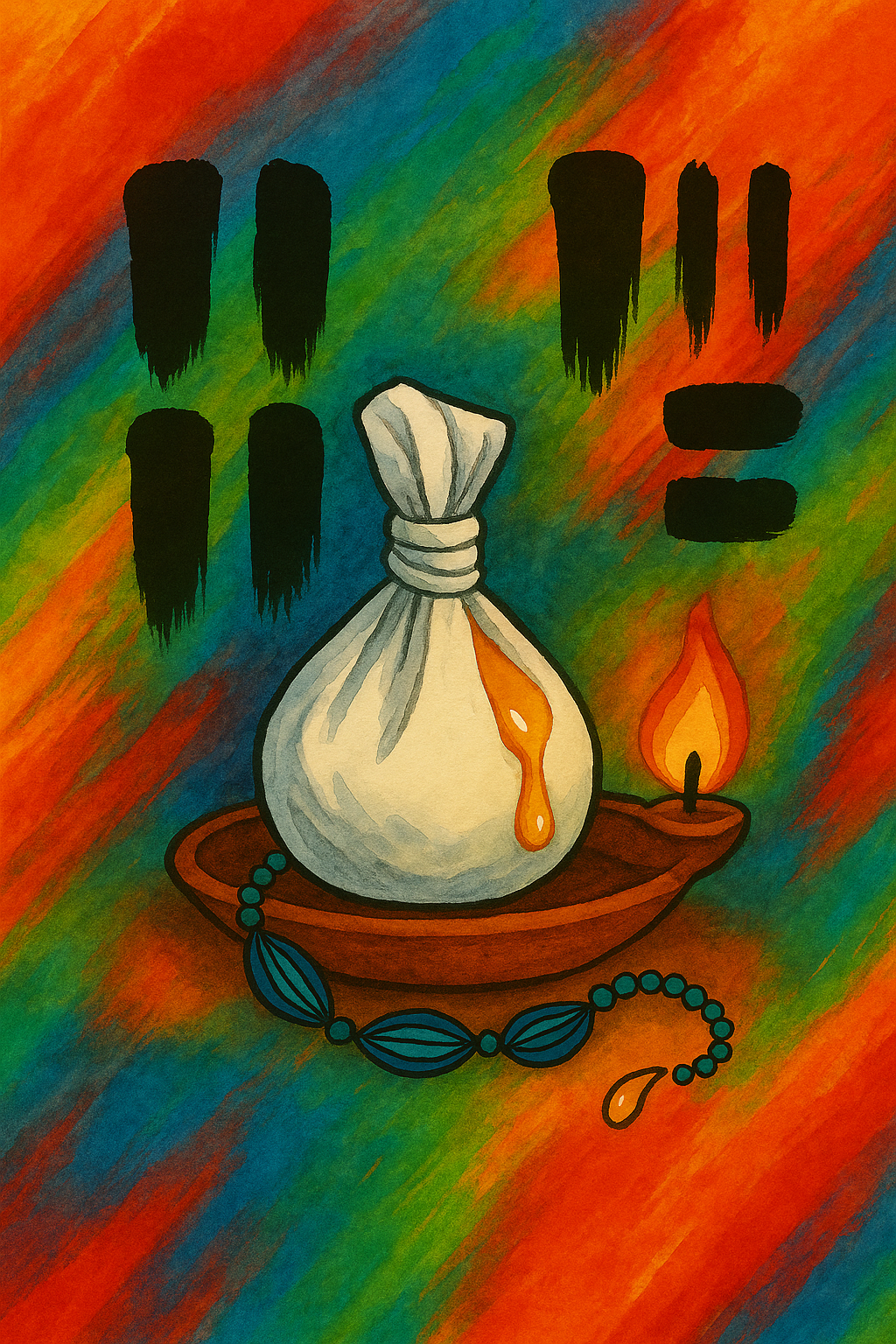Why “love” in Ifá isn’t a mood—it’s a sequence
In Ifá, love is not proven by intensity but by order: the right act, in the right timing, for the right reason—so blessing can arrive and remain. Where pop advice chases feelings, Ifá trains a pathway that relationships can actually walk: speak cleanly, build what you vow, guard your boundaries, and complete what you start. That four-beat rhythm is the backbone of my new book, Love in Òdù Ifá — A Journey Through the Sixteen Òdù (Themes Across Òdù Ifá, Vol. 1).
This article distills that journey for readers of DAILY IFÁ—giving you language you can pray and ethics you can practice today, without sensationalism or invented scripture. Orthography is harmonized throughout: Ifá, Òrìṣà, Òdù, Orí, Òg̀bè, Òfún, etc.
The map at a glance (from Òg̀bè to Òfún)
- Òg̀bè — beginnings done in the open, with clarity.
- Òyèkú — endings that become fertile soil.
- Ìwòrì — discernment: seeing the road beneath the dust.
- Òdì — boundaries that keep desire blessable.
- Ìròsùn — memory and promise braided into care.
- Òwónrìn — reversals as training, not doom.
- Òbàrà — eloquence tied to wisdom, not ego.
- Òkànràn — courage against panic and rumor.
- Ògúndá — workmanship: vows proven by visible repair.
- Òsá — truth without spectacle; timing as sacrament.
- Ìkà — the thorn that protects the garden (correction without cruelty).
- Òtúrụ́pòn — stress tests for structures and habits.
- Òtúrá — pattern, order, and the last stitch on the seam.
- Ìrètè — receipts: resolve what is owed so the name can shine.
- Òṣé — the mouth as shrine; speech as transport for blessing.
- Òfún — completion; the white cloth that lets joy stay.
Key idea: In Ifá, love matures through speech (Òṣé) → work (Ògúndá) → truth (Òsá) → completion (Òfún).
Four pillars of love in Ifá (and how to use them today)
1) The Mouth & the Road — Òṣé (with Èṣù)
Ifá treats the mouth as a shrine. Under Òṣé, we vet motive, cool the head, and let Èṣù “open the road” for words that are clean enough to carry blessing.
Practice: Before difficult talks, breathe, rinse the face, and decide the one repair your words must deliver. Speak less but truer.
2) Proof & Repair — Ògúndá
Love is not a promise—it’s the work that fulfills it. Ògúndá demands visible repair: the hinge oiled, the call returned, the apology carried out.
Practice: Pair every “I’m sorry/I will” with a dated action. Completion—not intention—heals trust.
3) Truth with Timing — Òsá
Right truth, wrong hour still wounds. Òsá consecrates disclosure: thunder only when the room can hold it; otherwise, prepare at the shrine, then speak.
Practice: Ask, “Shrine or square?” Some truths start in prayer and arrive later in conversation.
4) Completion — Òfún
Unfinished offerings make prayers hover. Òfún sets the white cloth so blessings can sit.
Practice: Each day, close one open circle—debt, promise, postponed amends. Peace follows finished tasks.
Orí, consent, and the ethics of staying
All love in Ifá answers to Orí (destiny’s seat). When Orí is fed and cooled, couples stop performing love and start livingit: boundaries feel dignified, speech lands, projects finish. When Orí is neglected, the home fills with “almost”—nearly healed, nearly honest, nearly together.
What the book adds (and why readers are loving it)
Love in Òdù Ifá walks these pillars through all sixteen chapters (one per Major Òdù), in lyrical but disciplined prose. No invented verses; clear signals when interpretation begins; Yorùbá diacritics maintained throughout. You’ll find:
- Felt theology you can use at home (speech, work, truth, completion).
- Myths and proverbs framed ethically—never as spectacle.
- A closing catechesis to pray with your partner or study circle.
CTA: Start with the chapter that matches your need—Òṣé for speech, Ògúndá for follow-through, Ìkà/Òdì for boundaries, Òfún for closure—or walk the whole cycle.
Common pitfalls Ifá can help you avoid
- Performing apology instead of completing it.
- Using truth as theater (public correction for private wounds).
- Mistaking chemistry for covenant (no boundaries, no plan).
- Demanding rain while the offering remains unfinished.
Who this helps
Devotees and students of Ifá/Òrìṣà (Lukumí/Santería, Candomblé, ATR), couples seeking mature guidance, counselors and community leaders integrating African spirituality, and readers curious about Orí, Èṣù, Ọbàtálá, Òṣun, Ṣàngó, Ògún in the daily work of love.
Start here: a simple daily liturgy
- Dawn: Greet Orí; choose one circle to close today.
- Midday: If conflict rises, ask “Shrine or square?” and act accordingly.
- Evening: Finish one promised repair.
- Night: Speak one gratitude and one truth that could not be said in the morning.
About the series
This book opens Themes Across Òdù Ifá, a companion to my technical works. After Love, the Seven Virtues in Ifá follow—Wisdom, Courage, Temperance, Justice, Faith, Hope—then volumes on Femininity, Orí, Community, Truth, Abundance, Ancestry, Health. Same structure, same discipline—one theme, sixteen gates.
Ready to go deeper?
Read Love in Òdù Ifá — A Journey Through the Sixteen Òdù, subscribe to DAILY IFÁ, and bring the Sixteen into your home—so your love can finish what it begins.






2 Responses
então eu quero muito fazer parte,desta família.mas no momento não estou com condições ! o livro e em português? eu quero comprar .e a minha pergunta e eu vou me curar ? a minha saúde está muito debilitada ,após a cirurgia!
Bom dia. O livro sobre os 256 Odus de Ifá também está em portugues na Amazon. Nao conheco suas condições pessoais por isso desculpe por nao poder responder às suas outras questões. Axé.